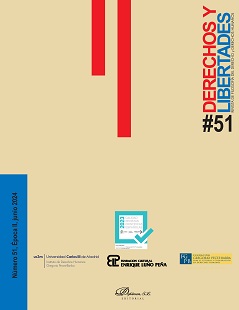Reflexión sobre los derechos fundamentales en la nueva Ley de la Inteligencia Artificial
Resumen
La Ley de la IA ha sido aprobada en marzo 2024 y el presente escrito analiza algunos aspectos de dicha Ley en relación con los derechos fundamentales, que preocupan tanto a la sociedad. Iniciando con algunos apuntes críticos relativos a la primera versión de la propuesta, el trabajo enfoca la visión general de los
derechos fundamentales presentada en esta Ley y argumenta que si bien los derechos fundamentales están presentes y concretados a través de distintos derechos en distintos contextos (laboral, consumo, etc.), la Ley no hace ninguna referencia sustancial a algunos de los derechos fundamentales, para los cuales
las aplicaciones basadas en IA podrían significar un gran cambio. En consecuencia, el artículo identifica algunos aspectos de la visión normativa de la IA que podría ser más beneficiosa a los ciudadanos y sus derechos.
Descargas
Derechos de autor 2024 Instituto de Derechos Humanos Gregorio Peces-Barba

Esta obra está bajo licencia internacional Creative Commons Reconocimiento-NoComercial-SinObrasDerivadas 4.0.
El Instituto de Derechos Humanos Gregorio Peces-Barba conserva copyright de los artículos, recensiones y noticias publicadas, siendo necesario citar la procedencia en cualquier reproducción parcial o total.
Los documentos incluyen la licencia Creative Commons 4.0: Reconocimiento–No comercial–Sin obra derivada (CC BY-NC-ND 4.0).
La revista Derechos y Libertades no cobra tarifas por recibir, procesar o publicar los artículos enviados por los autores.




